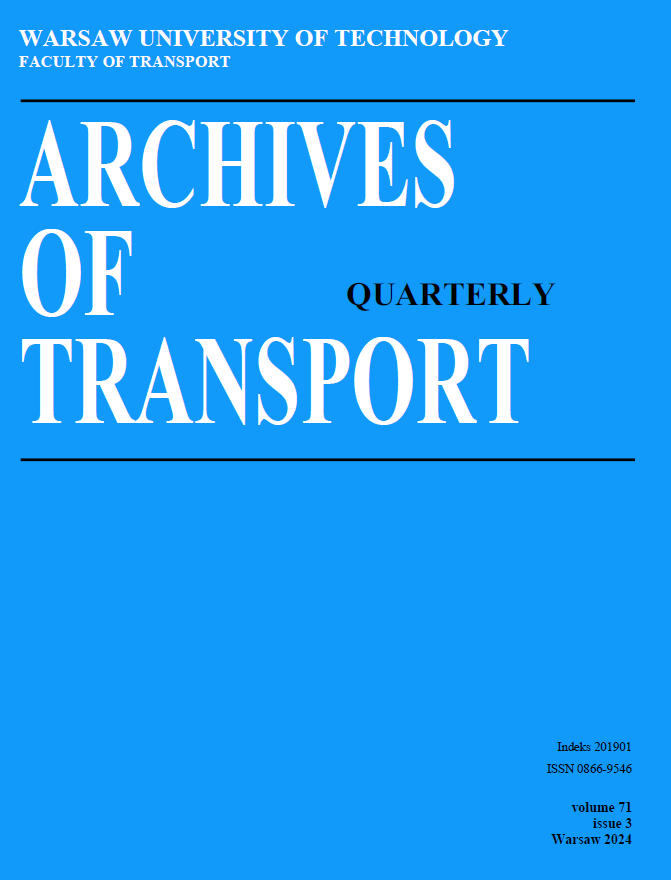Gansu, Qinghai and Ningxia regions of the new western land and sea corridor Freight network optimization
DOI:
https://doi.org/10.61089/aot2024.9q3h5352Keywords:
freight network optimization, new western land and sea corridor, genetic algorithm, economic radiation, topological attractivenessAbstract
The new western land and sea corridor makes use of a variety of transport modes to reach major ASEAN countries such as Singapore to the south, connects Southeast Asia and North America to the east, and connects Chongqing, Lanzhou and Xinjiang to the north with the China-European Union (CEU) liner train, which is a composite opening-up corridor in the western region for realising the regional linkage and international co-operation with ASEAN and other countries, and organically connecting with the "One Belt, One Road". In order to explore the regional freight network of Gan-Qing-Ning region of the new western land and sea corridor, we establish the model of node socio-economic attractiveness, topological charisma and comprehensive utility maximization, and analyze the index factors by using entropy weighting, Delphi and comprehensive evaluation methods through the Matlab Genetic Algorithm Toolbox to study the influence of node socio-economic attractiveness, topological charisma, node freight volume, logistics and transportation costs and construction costs on the utility of nodes of the new western land and sea corridor. The influence of the regional node utility of Gansu, Qinghai and Ningxia in the corridor. Analyze the problems and factors affecting the selection of nodes in the existing freight transport corridors in the three provinces. Completing the site selection of Gan-Qing-Ning regional node of the new western land and sea corridor and combining the import and export cargo volume of the three provinces to propose the construction of the South-Middle East three-lane freight corridor, and completing the optimization plan of the freight network. The results show that: scientific optimization and improvement of Gan-Qing-Ning regional freight network can promote the construction of freight network in the northwest region of the new western land and sea corridor, to meet the demand for freight transportation in the corridor, and to promote the development of the corridor industry and economic growth. Thus, it provides reference for the development of Gansu, Qinghai and Ningxia region and freight network optimization.
References
1. Notice of the National Development and Reform Commission on the Issuance of the Master Plan for New Western Land and Sea Corridors [EB/OL]. (2019). http: //www.gov.cn/xinwen/2019-08/15/content_5421375.htm
2. Ma, W., Wang, X., (2021). Opportunities and Challenges of China's Cross-border E-commerce in the Middle East under the "Belt and Road" Initiative. Contemporary Economy, 000(003): 58-61. http://doi.org/10.3969/j.issn.1007-9378.2021.03.016
3. Li, Shumei., (2020). Research on the synergistic mechanism of cross-border emergency logistics in the new western land and sea corridor. Logistics Science and Technology, 43(05): 63-64+72. http://doi.org/10.13714/j.cnki.1002-3100.2020.05.017
4. Fu, Y., (2019). Research on high-level construction of new land and sea corridors in western Chi-na. Regional Economic Review, (04): 70-77. http://doi.org/10.14017/j.cnki.2095-5766.20190717.003
5. Wang, J., (2019). Challenges and Strategies for the Construction of Logistics System of "New Western Land and Sea Corridor". Foreign Economic and Trade Practice, (05): 83-85. http://doi.org/10.3969/j.issn.1007-9378
6. OH Yoon Ah, (2018). "China's Economic Ties with Southeast Asia". Journal of Current Southeast Asian Affairs. https://doi.org/10.2139/ssrn.3038741
7. SV Siar, (2014). Prospects and challenges of brain gain from ASEAN integration. IDS Discussion Paper Series. https://doi.org/10.1355/9789814762175-008
8. KYAW LYNN., (2009). Major Industries and Business Chance in CLMV Countries. Brc Research Report. https://doi.org/10.1057/9780230389427.0016
9. Vatthanamixay., (2011). Foreign Direct Investment, Real Exchange Rate Misalignment, and Export Performanceof Lao PDR. Journal of International Development and Cooperational. 31-51.
10. Zhang J., Zhang Q. N., (2023). Research on the identification of importance degree and network construction of regional urban freight nodes. Road and Motor Transport, (03), https://doi.org/12-18+2310.20035/j.issn.1671-2668.2023.03.004
11. Jie L, Xumei C, Zengli F., (2020). Construction and application of regional urban hub-and-spoke freight transport network model. Journal of Harbin Institute of Technology, 52(09): 1-7.
12. Pan H., (2012). Layout planning research on railway logistics nodes in hierarchical classification. Beijing:Beijing Jiaotong University.
13. Yu S, Yang Z, Yu B., (2017). Air express network design based on express path choices–Chinese case study. Journal of Air Transport Management, 61: 73-80. https://doi.org/10.1016/j.jairtraman.2016.04.008
14. Shimizu Y, Fushimi H, Wada T., (2011). Robust logistics network modeling and design against uncertainties. Journal of Advanced Mechanical Design, Systems, and Manufacturing, 5(2): 103-114. https://doi.org/10.1299/jamdsm.5.103
15. Guelat J, Florian M, Crainic T G., (1990). A multimode multiproduct network assignment model for strategic planning of freight flows. Transportation science, 24(1): 25-39. https://doi.org/10.1287/trsc.24.1.25
16. Friesz T L, Gottfried J A, Morlok E K., (1986). A sequential shipper-carrier network model for predicting freight flows. Transportation Science, 20(2): 80-91. https://doi.org/10.1287/trsc.20.2.80
17. Davendralingam N, Crossley W., (2014). Robust approach for concurrent aircraft design and air-line network design. Journal of Aircraft, 51(6): 1773-1783. https://doi.org/10.2514/1.c032442
18. Powell W B., (1986). A local improvement heuristic for the design of less-than-truckload motor carrier networks. Transportation Science, 20(4): 246-257. https://doi.org/10.1287/trsc.20.4.246
19. Liu S, Chan F T S, Chung S H., (2011). A study of distribution center location based on the rough sets and interactive multi-objective fuzzy decision theory. Robotics and Computer-Integrated Manufacturing, 27(2): 426-433. https://doi.org/10.1016/j.rcim.2010.09.003
20. Pawel D, Monika W, Radovan M, et al. (2017). Optimization of the post logistics network and location of the local distribution center in selected area of the Lublin Province. Procedia Engineer-ing, 192: 130-135. https://doi.org/10.1016/j.proeng.2017.06.023
21. Kuo M S, (2011). Optimal location selection for an international distribution center by using a new hybrid method. Expert Systems with Applications, 38(6): 7208-7221. https://doi.org/10.1016/j.eswa.2010.12.002
22. Holzapfel A, Kuhn H, Sternbeck M G, (2016). Product allocation to different types of distribution center in retail logistics networks.European Journal of Operational Research, 264(3): 948-966. https://doi.org/10.1016/j.ejor.2016.09.013
23. Tong, H., (2022). Research on the site sele- ction and path layout of the logistics distri- bution center of marine ships based on a mathematical model. Archives of Transport, 63(3), 23-34. https://doi.org/10.5604/01.3001.0015.9925
24. Yang, Ju., Duan, A., (2018). Research on the attractiveness of urban logistics nodes in Wuhan based on the evolution analysis of freight network topology. Mall Modernization, (20): 73-74. https://doi.org/10.14013/j.cnki.scxdh.2018.20.040
25. He, S., Guo, Y., Zhu, W., Shao Meichen, Guo Shuai, (2023). Optimization study of bi-objective emergency logistics network considering equilibrium slack inventory under epidemic situation. Railway Transportation and Economy, 45(01): 22-29. https://doi.org/10.16668/j.cnki.issn.1003-1421.2023.01.03
26. Ji Y, Yang H, Zhang Y, (2013). Location optimization model of regional express distribution center . Procedia-Social and Behavioral Sciences, 96:1008-1013. https://doi.org/10.1016/j.sbspro.2013.08.115
27. Paweł D, (2017). Optimization of the post logistics network and location of the local distribution center in selected area of the Lublin province. Procedia Engineering, 192:130-135. https://doi.org/10.1016/j.proeng.2017.06.023
28. He Y, Wang X, Lin Y, (2017). Sustainable decision making for joint distribution center location choice. Transportation Research Part D Transport & Environment, 55:202-216. https://doi.org/10.1016/j.trd.2017.07.001
29. Zhu Y, Fan H, (2016). Vital nodes evolution study on railway network of silk road economic belt. Journal of Data Analysis and Information Processing, 4:115-123. https://doi.org/10.4236/jdaip.2016.43010
30. Zong, F., Li, Y., Zhang, H., et al. (2022). A model of distribution center location along the "Belt and Road". Journal of Jilin University: Engineering Edition, 52(11): 8. https://doi.org/10.13229/j.cnki.jdxbgxb20210343
31. Pawlowski S D, (2005). The Delphi method as a research tool: an example, design considerations and applications. Infor- mation & Management, 42(1):15-29. https://doi.org/10.1016/j.im.2003.11.002
32. Huang, C., Tian, S., Zheng, S., (2022). Spatial measurement and evaluation of land transportation accessibility based on GIS. Journal of Chongqing Jiaotong University, 22(04): 23-28. https://doi.org/10.3969/j.issn.1674-0297.2022.04.004
33. Peng, Y., Mo, Z., Liu, S.,(2021). Passeng- er’s routes planning in stochastic common-lines’ multi-modal transportation network through integrating Genetic Algorithm and Monte Carlo simulation. Archives of Transport, 59(3), 73-92. https://doi.org/10.5604/01.3001.0015.0123
Downloads
Published
Data Availability Statement
Source of data: China National Statistical Yearbook, Statistical Bulletin of National Economic and Social Development of Cities and Prefectures.
Issue
Section
License
Copyright (c) 2024 Archives of Transport journal allows the author(s) to hold the copyright without restrictions.

This work is licensed under a Creative Commons Attribution 4.0 International License.










